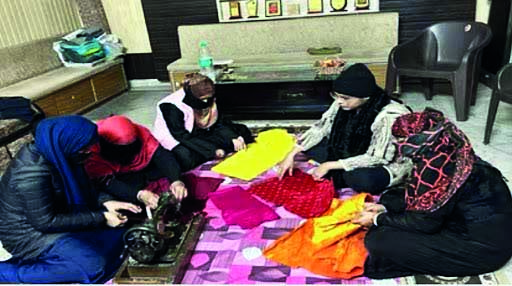Communal harmony shines as Muslims play integral role in Ram Temple inauguration

Lucknow: In a remarkable display of communal harmony, Muslim women from Bareilly, led by Farhat Naqvi, President of Mera Haq Foundation, are gearing up to convey a powerful message of inclusivity during the consecration of Ram Lalla in Ayodhya.
These resilient women plan to present a handmade dress to Ram Lalla in an effort to foster unity.
Under the guidance of Farhat Naqvi, preparations are in full swing, with 40 women engaged in zari work dedicating handcrafted clothes to Lord Ram.
The renowned brocade work of Bareilly is being utilised to create a special dress for Ramlala, with Naqvi herself contributing to the crafting process.
‘We are in touch with Ram Janmabhoomi Teerth Kshetra Trust members, and they have advised us to visit Ayodhya after January 26 and present our handmade gifts to Ram Lalla,’ shared Naqvi, expressing her commitment to fostering social harmony.
The initiative not only involves presenting the handmade gifts but also includes fundraising efforts to support the Ram temple.
The collected funds will be discreetly handed over to the trust as a donation, underscoring the collaborative spirit of this endeavor.
Muslim participation in the consecration of the Ram Mandir is not a recent development.
The inclusive nature of the temple’s upkeep is evident through stories like Abdul Wahid, a welder, who played a pivotal role in maintaining the temple’s security during the period when Ram Lalla was housed in a makeshift temple.
Mohammad Asad, a senior supervisor working at the sanctum sanctorum of the temple, emphasised his fortune in contributing to the construction.
‘There is no pressure on me from my family or Muslim friends. In fact, they all believe that I am lucky to be working here,’ he said.
Anil Shastri, a trustee of the Ram Janmabhoomi Teerth Kshetra Trust, highlighted that around 15 per cent of the labour force employed in the construction of the Ram Temple is Muslims, emphasising the absence of discrimination based on caste, colour, or religion.
The tradition of Muslim participation continues, as seen with Sadiq Ali, a tailor known for stitching clothes for “Ram Lalla,” and Munna Mali, a Muslim flower garland seller at Hanumangarhi Gate in Ayodhya.
Mali’s family has been adorning the small temple with flowers since its re-establishment in 1992, expressing excitement about the upcoming inauguration of the new Ram Mandir.
The collective efforts of these individuals reflect a broader narrative of unity and inclusivity, transcending religious boundaries in the spirit of devotion to Lord Ram.



